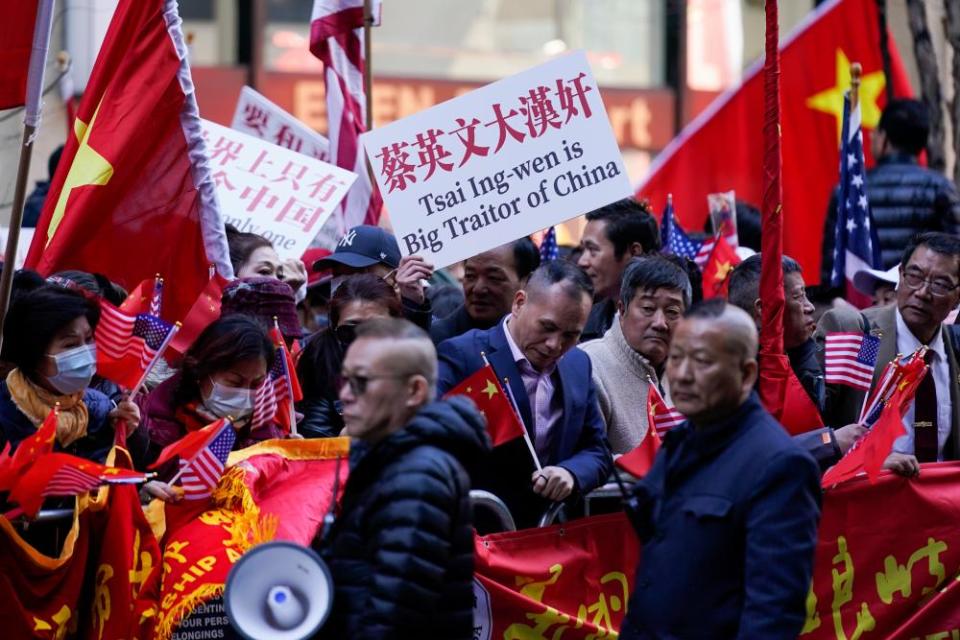China renews threats as Taiwan president greeted by crowds in New York
Chinese officials have warned of “serious” consequences if Taiwan’s president, Tsai Ing-wen, meets the US House speaker next week, after Tsai arrived in New York to crowds of supporters and protesters.
Tsai is stopping in the US twice during her 10-day visit to Taiwan’s diplomatic allies Guatemala and Belize. Her itinerary has not been disclosed and none of the events were open to the public or media.
There are expectations Tsai will meet Kevin McCarthy in Los Angeles on her return journey. On Thursday China’s charge d’affaires in Washington, Xu Xueyan, told reporters any meeting between Tsai and McCarthy would have a “serious, serious, serious” impact on US-China relations.
Relations between the two nations have declined sharply, after a Chinese weather balloon flew into US airspace and was shot down, undoing months of work by both sides to repair relations.
In Beijing a spokesperson for China’s foreign ministry (Mofa) reiterated threats made on Wednesday to “fight back” if the meeting went ahead. Mao Ning said Beijing was closely following developments and would “resolutely safeguard our sovereignty and territorial integrity”.
McCarthy had been keen to visit Taiwan, and a meeting between the two in the US has been described as an effort to avoid a repeat of last August, when McCarthy’s predecessor, Nancy Pelosi, stopped in Taipei and met Tsai. The visit angered Beijing, which staged days of intensive live-fire military drills around Taiwan’s main island in response.
Related: The Asia-Pacific flashpoints fuelling an arms race across the region
On what is her first US stopover since 2019, Tsai touted Taiwan’s economic, security and diplomatic achievements in a closed-door speech on Wednesday night to overseas Taiwanese in New York, her office said in a statement on Thursday, calling the island a “beacon of democracy in Asia”.
“In particular, the relationship between Taiwan and the United States is closer than ever,” she said, noting “significant progress” in economic and security cooperation.
Tsai said Taiwan Semiconductor Manufacturing Co, the world’s largest contract chipmaker, establishing a factory in Phoenix, Arizona, demonstrated the island’s technological strength.
Though Taiwan faced “enormous challenges”, it would not be isolated, Tsai said. She also thanked the US government for implementing security agreements with Taiwan, including nine announced arms sales by Joe Biden’s administration.
On Thursday, the director general of Taiwan’s national security bureau told parliament it expected a less hostile reaction to a Tsai-McCarthy meeting on US soil.
“We believe that the actions the Chinese communists might take are unlikely to go as far as being as large as when Pelosi visited last August,” the director general, Tsai Ming-yen said, echoing comments from defence officials earlier this week, that Taiwan had detected no sign of unusual Chinese military activity or escalation.
The director general appeared to confirm the meeting would go ahead. “She will be meeting in the United States, so the political complexity is not as high as the speaker coming to Taiwan.”
Taiwanese and US officials have emphasised that the two-day New York visit is a transit stopover, her seventh in the US since becoming president, and not an official visit. But China’s ministry of foreign affairs has rejected that characterisation.
“The trip is not so much a ‘transit’, but an attempt to seek breakthroughs and propagate ‘Taiwan independence’,” Mofa spokesperson Mao said on Wednesday. “The issue is not about China overreacting, but the US egregiously conniving at and supporting ‘Taiwan independence’ separatists.”
Videos shared on social media and from the travelling press pack show Tsai arriving at a New York hotel, waving at a crowd of supporters holding US and Taiwan flags. She was surrounded by a heavy security detail and accompanied by Taiwan’s de facto ambassador to the US, Hsiao Bi-khim.
A larger crowd of protesters also gathered nearby, waving US and Chinese flags and holding signs saying “there is only one China in the world”, “Taiwan independence has no way out, Taiwan independence is a dead end”, and “support China’s reunification and resolutely oppose Taiwan independence”.

The anti-Tsai protests appeared to be organised by local Chinese organisations, including the Brooklyn Chinese United Overseas Chinese Mission, according to screenshots shared by a protest-monitoring Twitter account, whyyoutouzhele. The screenshots detailed the time and place of protests, and offered transport. On Thursday a top Taiwan national security official alleged protesters were offered US$200 (£162) to attend, but did not specify who paid.
Large banners were branded Fu Zhou Lang Qi Association, and the Fujian Foundation in USA. The latter is registered to a New York city address and last year held a 20th party congress-themed symposium calling for overseas Chinese people to “contribute to the great rejuvenation of the Chinese nation”, a goal which includes the annexation of Taiwan. The Overseas Chinese World Conference for Promoting Peaceful Reunification of China also held a press conference saying Tsai’s visit “seriously undermines the peaceful development of cross-strait relations”.
One Taiwan supporter took a dig at those protesting, holding a sign saying “Taiwan so awesome, even China can’t stop talking about us”. Another noted the irony that the China supporters were allowed to protest in the US.
The stopovers are unofficial, and the US government has said she will not meet anyone from the Biden administration. It has warned Beijing not to use Tsai’s “normal” visit as a pretext for hostile action.
Beijing routinely objects to any international interaction with Taiwan’s government. It claims Taiwan as a Chinese province and has vowed to annex it. Taiwan’s leaders maintain it is a sovereign nation with no need to declare independence, and that its future is for its people to decide.
Tsai has said her country was only more determined to engage with the international community, and was “calm, confident, unyielding, and non-provocative”.
Additional research by Chi Hui Lin

 Yahoo News
Yahoo News 
